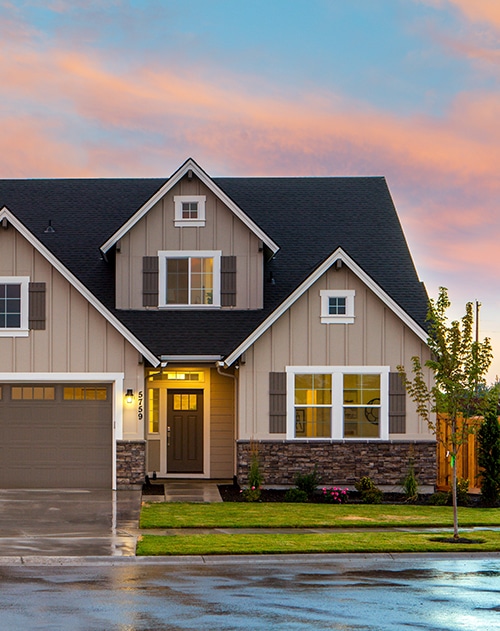Competitive Rates
We work hard to keep our costs down and pass the savings on to you. That’s how we’re able to offer great loans—and great rates—that our competitors can’t match.
Same-Day Pre-Approvals
We offer same-day pre-approvals you can rely on. Find out your personalized rates in no time with our easy online application.
A+ Rating with BBB
Our past clients are happy, and it shows. We’re proud to have the highest possible rating with the Better Business Bureau, because it means we’re doing right by our customers.

What Is the FHA?
First, it’s important to understand the FHA and its function. The FHA, or the Federal Housing Administration, is a part of the U.S. Department of Housing and Urban Development. Created in 1934 in response to the housing crisis caused by the Great Depression, the FHA is dedicated to helping more people become homeowners.
The FHA was created to help stop an increase in foreclosures and make owning a home more affordable for Americans. The FHA insures mortgages for up to 80% of a home’s value (up from the 50 to 60% that was previously the norm for home loans). This makes loaning money to home buyers less risky for lenders and, in turn, helps them to offer more and better mortgages to future homeowners.
Although the FHA loan was created decades ago, securing an FHA loan is still a great (and affordable!) option for many prospective homeowners.
What Is an FHA Loan?
An FHA mortgage is a home loan that is backed by the Federal Housing Administration. Because this type of loan is insured by the FHA, lenders such as private mortgage companies, banks, and credit unions can offer better deals and terms to applicants who have low credit and low savings.
Often, FHA loans are an option for those who may not otherwise qualify for a conventional home loan, making them a popular choice for first-time home buyers or those with specific financial challenges. However, FHA loans can only be issued by FHA-approved lenders and require specific circumstances to qualify.

Differences Between FHA & Conventional Loans
FHA loans differ from conventional loans in many ways. Most FHA loans require less money down from the borrower, allow a higher debt-to-income ratio, and require lower credit scores to qualify. Compared to conventional loans, FHA rules are also more flexible as they pertain to financial gifts for down payments. In addition, many FHA home loans can even sometimes result in lower mortgage payments.
Despite all the benefits of FHA loans, however, there are some drawbacks you should be aware of. FHA loans can require closing costs that typically aren’t required by conventional loans. They also are only available for certain property types and are subject to loan amount restrictions (based on where the property is located). In addition, FHA loans also require mortgage insurance built into every loan, which means borrowers could end up paying for mortgage insurance for much longer than those who choose conventional loans.
Types of FHA Loans
FHA loans come in a variety of loan types, ranging from standard loans to loans that are tailored to meet very specific needs. Some common FHA loan types include:
-
Basic Home Mortgage 203(b)
For purchasing or refinancing a primary residence
-
203(k) Rehab Mortgage
For financing homes that need work done, a.k.a. “fixer uppers”
-
Construction Loan
For buying property and then building a new construction home
-
Title 1 Property Improvement Loan
For financing home improvements and supplementing 203(k) rehab mortgages
-
Energy Efficient Mortgage
For financing energy improvements to a home
FHA Loan Requirements & Process
In order to receive approval for an FHA loan, you’ll need to first meet certain requirements. These include:
- Minimum of 3.5% down payment, possibly more (depending on your credit score)
- Credit score of 550 or higher (though other lenders will likely require higher scores!)
- Debt-to-income ratio of less than 50% of your pretax income
- Property approval ensuring that the property meets the FHA’s minimum property requirements via an FHA-specific appraisal
- Mortgage insurance, which is built into the loan but includes an upfront mortgage insurance payment
Although the FHA insures these types of loans, it does not regulate them in terms of requirements, interest rates, and fees. So it’s important to consider that every FHA-approved lender may have its own approval process, rates, and fees. This means you’ll still want to comparison shop to get the best loan for your needs.
The process of getting an FHA loan has changed over time, despite the fact that the minimum requirements to be approved for an FHA loan have not. This is because FHA lenders can set their own requirements for loans and recently have begun to favor applicants with higher credit scores and higher down payments. When looking to get an FHA loan, be sure to compare loan terms from multiple lenders to assess the current landscape of lending requirements.
Benefits of Choosing Us as Your Lender
Benefits of choosing The Home Loan Expert to finance your FHA loan include:
- Lower interest rates than most conventional loans
- Easier qualifying terms than conventional loans
- Down payments as low as $0
- Taking advantage of down payment assistance programs
- Ability to finance condos, single-family homes, manufactured homes, and multifamily (1-4) units
- Qualifying even if you’ve had financial issues or bankruptcy in the past
- We accept credit scores as low as 550
Let The Home Loan Expert Help!
Buying a home is an involved process that takes time, effort, and thoughtfulness. These factors are true for all home loans, but especially for FHA-backed loans, since borrowers and the property to be financed must meet specific requirements.
For anyone considering an FHA loan, having the support of experienced loan experts will be extremely helpful. At The Home Loan Expert, we can walk you through the process of finding, applying, and getting approved for an FHA loan. Our team can ensure that you and your future home meet all the necessary criteria of FHA-insured loan while helping you get a better understanding of the process.
With our easy-to-use mortgage calculator, you can easily get an idea of the various loan options available to you. And our team is ready to help when you’re ready to take the next step! Contact us to see how easy owning a home can be.
Learn About Other Loan Types
Adjustable Rate Mortgage
When you’re shopping for a new home, one of your most important decisions will be what kind of mortgage to take out to finance your home. Your mortgage type will be the top factor that influences how much you can borrow(and thus what kind and size of home you purchase), as well as your monthly budget moving forward. For a variety of reasons, an adjustable-rate mortgage (ARM) can be an appealing choice in the short term, but it can seem scary as well. However, it’s important to understand how ARMs work, since this type of loan has repayment terms that may become less desirable over time.
Fixed-Rate Loans
Fixed-rate mortgages—also called “conventional mortgages”—are basically the bread and butter of the mortgage industry. And that’s because this loan type is still the most reliable way to finance your home, offering affordability, flexibility, and so much more. As their name suggests, fixed rate loans have the same rate throughout the entire term of the loan. So even if interest rates rise while you’re paying off your loan, your rate and payment amount are locked in for the entire loan term. That’s why fixed-rate mortgages are so popular–they offer protections that ARMs can’t.
Conventional Loan
When buying a home, borrowers have a lot of options for securing financing. There are so many different types of loans, and each serves a specific purpose. This means that when you’re looking for a home loan, you should always do research on what kind of loan is best for your unique needs and financial situation. One of the most commonly utilized and most popular loan options that you’ll likely come across in your search is the conventional loan. Conventional loans are mortgage loans that aren’t insured or guaranteed by the federal government. These are a great choice for homeowners, since they offer lower costs than many other popular loan types. We offer competitive rates for both fixed and adjustable loans, with terms ranging from five to thirty years.


